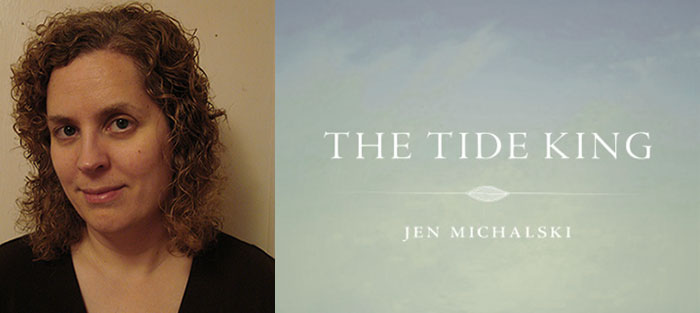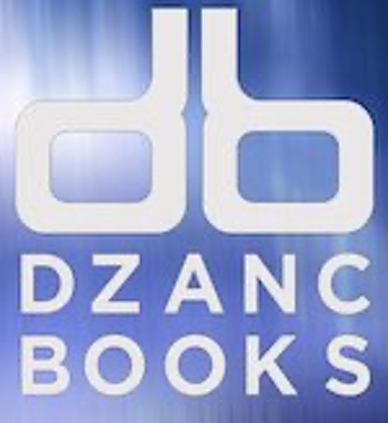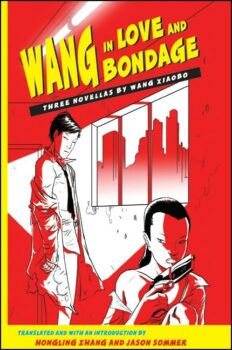I first met Jen when I invited her up to York College of Pennsylvania to meet the students and share from her new books, but after I read The Tide King, I had to tell everyone I knew about this big work of human magical history. When I read her collection of novellas from Dzanc, Could You Be With Her Now, I was blown away again. Everyone should read the second novella in that collection, “May-September,” for the same reasons we should read Mrs. Dalloway and “Sonny’s Blues”—to witness in prose the motions of the human heart.
Jen Michalski is author of the novel The Tide King (Black Lawrence Press, 2013), winner of the 2012 Big Moose Prize; two collections of fiction, From Here and Close Encounters (So New, 2007; Aqueous Books, 2013); and a collection of novellas, Could You Be With Her Now (Dzanc Books, 2013). In 2013, she was named one of “50 Women to Watch” by The Baltimore Sun, and she was declared “Best Writer” by Baltimore Magazine in their “Best of Baltimore” issue. She is the founding editor of the literary quarterly jmww and host for both the Starts Here! reading series at Artifact Coffee and the biannual Lit Show. She lives in Baltimore.
Interview
Travis Kurowski: Would you mind talking a bit about Could You Be With Her Now? I loved that book. The second novella reminded me of how I felt reading Virginia Woolf. If I didn’t already know you, I would have hunted down your email and sent you a long note about the book. Did you feel like this book was a breakthrough in any way for you? What’s your reading of it?
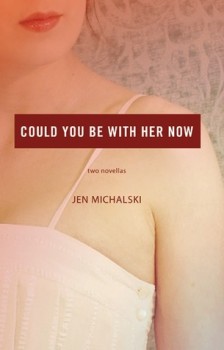 Jen Michalski: Thank you! I love when people are moved by the book and want to get in touch with me about it, because I struggled for a long time of whether even to write the second novella, “May-September.” Not because of the content, but because the story came entirely to me in a dream, and it seemed indulgent in some way, too easy. But it wasn’t easy; even though the plot had already been mapped out, it took several months before I was able to begin writing it because I wasn’t sure about the voice. When I’m writing novels, there is a general prose voice that I seem to write in and can adjust as needed. But the voice for this story, since it came from a dream, is in a purgatory/way station of sorts. Sandra’s, the older woman’s, condo, needed to feel dreamy, blurry, unstable. Alice and Sandra’s relationship is never fully formed, is based more in their own pasts than present because they know, probably, they will never have a future. I really struggled, refusing to even put fingers to keyboard until I heard “the voice.” One day, it just started to speak to me and I wrote it down, and three months later, I was finished.
Jen Michalski: Thank you! I love when people are moved by the book and want to get in touch with me about it, because I struggled for a long time of whether even to write the second novella, “May-September.” Not because of the content, but because the story came entirely to me in a dream, and it seemed indulgent in some way, too easy. But it wasn’t easy; even though the plot had already been mapped out, it took several months before I was able to begin writing it because I wasn’t sure about the voice. When I’m writing novels, there is a general prose voice that I seem to write in and can adjust as needed. But the voice for this story, since it came from a dream, is in a purgatory/way station of sorts. Sandra’s, the older woman’s, condo, needed to feel dreamy, blurry, unstable. Alice and Sandra’s relationship is never fully formed, is based more in their own pasts than present because they know, probably, they will never have a future. I really struggled, refusing to even put fingers to keyboard until I heard “the voice.” One day, it just started to speak to me and I wrote it down, and three months later, I was finished.
Both of the novellas in Could You Be With Her Now were sort of breakthroughs for me. I wrote them both in 2009, I think, and Michael Kimball was very influential in helping me discover my own “language” for them, the parameters of not only a particular piece, but my own parameters — words I would never use in my writing, words I would. So both “I Can Make It to California Before It’s Time for Dinner” and “May-September” were the first times I approached stories through language first — my first instinct is to use simile, metaphor, sentence structure. In the novellas, it was more of an effect of synesthesia — certain words had a certain color, weight, texture. It was all very physical, like painting, and very fitting, given the strong, raw subject matter contained in both novellas. It was almost as if they deserved a different approach.
What is your process? You’re a poet as well as a writer — I know you’re particularly interested in language. When you’re writing something, does the voice, impression, the sound/cadence have to come to you first, or is getting the idea down just enough, the puzzle pieces, as it were, of the puzzle?
Honestly, I couldn’t be much of a poet without a computer. I’m fairly technology dependent. I could probably break the habit, but would have to relearn everything.
I find myself (unintentionally, almost unconsciously) writing three or so versions of the same story at the same time. Eventually I see that these three stories are the same — same characters or same intention, and I realize I’ve got to merge them together. So then it’s days of weaving the pieces in and out while adding tissue to connect the structure. And then I actually begin to see the story, and can finally begin writing it.
What about you? Technology dependent?
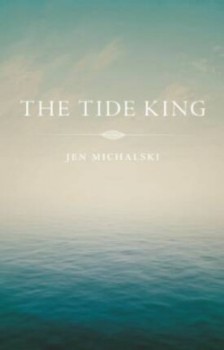 It’s hard to believe when I was a teenager I’d write novels in longhand (of course, my handwriting was much more legible then). I don’t think technology has changed my writing as much as poetry (which I’m terrible at) has. When I gave up poetry after college and concentrated on writing prose, I still retained some of its lyricism. Of course, I’m a huge Virginia Woolf fan, too, and she’s been a great influence.
It’s hard to believe when I was a teenager I’d write novels in longhand (of course, my handwriting was much more legible then). I don’t think technology has changed my writing as much as poetry (which I’m terrible at) has. When I gave up poetry after college and concentrated on writing prose, I still retained some of its lyricism. Of course, I’m a huge Virginia Woolf fan, too, and she’s been a great influence.
It’s funny, though, that you mentioned writing three or so versions of the same story. With The Tide King, I was writing that novel for ten years and not really knowing it, bits and pieces in different things. I often thought of myself as a short story writer, but it seems like, lately, all my short stories have been turning into novels. Maybe I’ve been a novelist all along who was unable to see that my process of creating a novel was finding all of the spokes of it, the little stories, and figuring out their relationships to each other. Writing is kind of like a puzzle, a big crossword puzzle. Some people play games to keep their minds practiced, and I think for writers, it’s puzzling out stories.
Donna Tartt said recently that writing is one level deeper than reading. I’m not sure I entirely agree with that. When you’re reading, listening to music, watching a movie, you’re essentially passive. You may be processing the pieces, but they are being fed to you, in a specific order, a specific spin. Omissions and additions are purposeful. So I think writing, or creating, is more than one level down. In fact, I’m not even sure it’s on the same plane.
How did The Tide King eventually come together?
I learned a very important lesson about expectations, about going where the story is taking you and not trying to force it down the narrow funnel of your initial outline. A few years ago I was reading an old National Geographic article about a father-son diving team who were interested in finding the sunken WWII battleship, the Bismarck. There’s a coda at the end of the article that reveals that son had died in a car accident after they returned to the states, and I wanted to write about that. But when I started writing, I started writing about a solider (Stanley) in Germany. I wasn’t sure what to do. My grandfathers both served in the war, and I was interested in living their experience vicariously, since they never talked about it, but so much has been written about the war and I was reluctant to wade in. But I persisted — after all, this soldier Stanley appeared out of nowhere and spoke to me so vividly that I decided to follow his lead.
Around this time I opened up a file of a novel I’d started many years earlier, wrote 50 pages, and forgot about. It featured an enchanted, immortal herb (and also Heidi and Stanley, who was her grandfather in this novel). Suddenly, the whole book was just kind of there in front of me: what if Stanley gave the enchanted herb to another soldier, hoping to save him? What kinds of butterfly-effect repercussions would occur if, every few centuries, a person did not die? How would these immortals connect with other people, with their environments? And here, I thought I was just going to write short story about the Bismarck.
We are both journal editors in addition to being writers, and I’m interested in your perspective on that role.
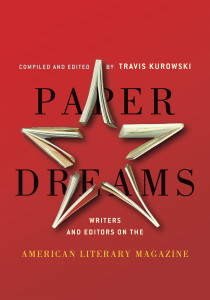 I loved your answer in your interview with Atticus Books that compiling Paper Dreams “was to combat my own ignorance regarding the matter” of the history, mission, publishing challenges, and politics of literary journals because, in a way, that was why I started jmww back in 2004. I had just finished my graduate studies, wasn’t sure how to meet other writers and stay involved in a community I’d only just begun to learn about. So I rolled up my sleeves and dived in. So many of us have similar stories. When you think of the movers and shakers of the literary community, they’ve all headed journals — Roxane Gay, Blake Butler, Dave Housley, Matt Bell, Aaron Burch, Giancarlo DiTrapano.
I loved your answer in your interview with Atticus Books that compiling Paper Dreams “was to combat my own ignorance regarding the matter” of the history, mission, publishing challenges, and politics of literary journals because, in a way, that was why I started jmww back in 2004. I had just finished my graduate studies, wasn’t sure how to meet other writers and stay involved in a community I’d only just begun to learn about. So I rolled up my sleeves and dived in. So many of us have similar stories. When you think of the movers and shakers of the literary community, they’ve all headed journals — Roxane Gay, Blake Butler, Dave Housley, Matt Bell, Aaron Burch, Giancarlo DiTrapano.
Editing a literary magazine really helped me not only discover a lot of great writers but also have the opportunity to network. By the time The Tide King was published, even though Black Lawrence Press is a pretty small indie, and there’s not a lot of infrastructure in place for traditional publicity, I felt like I was in a good position to get reviews or interviews because I’d been working on jmww for almost 10 years in addition to co-hosting the 510 Reading Series here in Baltimore. And this is a question I get a lot, I mean, a lot — writers want tips on how to get publicity, like there’s some formula or magic list I’ve been using. All I can say is that you have to put in your time¾you have to get to know people, you have to promote other people’s work, interviewing them, reviewing their books. You have to give to get. And even then, you can’t expect to get.
I certainly don’t see myself as any sort of “mover and shaker,” but I’ve heard these stories told by Roxane, Aaron, Blake, James Yeh, and others about how getting involved as a publisher has helped them be happier, less frustrated artists. Things seem less mystical, magical. There’s no longer some sort of wizard behind the curtain, which is how it feels when you start writing. Publishing Luna Park did make it all less cryptic. And this is what Matt Bell and Blake Butler and Cathy Day and others speak so eloquently about — it humanized that writing world for me. Luna Park got me talking to people, helping people, telling people how much I appreciated their stuff. And everyone, once that conversation started, became more human, myself included.
What are you working on now?
Another novel. This one grew from a story that storySouth published a few years ago. It seemed unfinished to me, in a way, and what was once fifteen pages is now sixty and growing. I’m interested in people’s ideas of home and what happiness is (happiness at the expense of others—yours or another’s). There always seems to be sacrifice in love, but how much is too much?
It’s funny that I started writing poetry in college and moved to short stories and now seemed settled into novels. It’s the opposite of what some of my friends (like Joseph Young) are doing, whose stories have gotten sparser and sparser. I wonder if it’s because I’m getting older, and I have a lot more from which to draw. When I was younger, I was looking for connections, for distilled moments, for the essence of something, for life to make sense. Now, I just love spreading the old crazy quilt out that my brain keeps knitting and look at it, pet it

